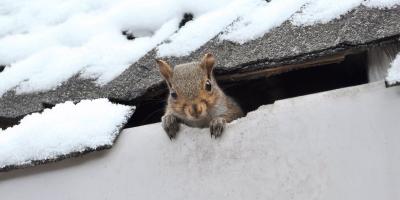How Do Spiders Survive Winter In New England?

Snowflakes, sledding, sipping cocoa - spiders?
When the cold weather hits and the holiday season rolls around, the last thing any homeowner wants to worry about is a pest problem - and with most pests unable to really do much until spring, it’s no wonder so many New England homeowners are surprised to find spiders still thriving even in the middle of the snowy season.
Whether they’re hanging from a web in the undisturbed corners of your garage, shed, basement, or attic with enough energy to make it through till spring, spiders may just be the least welcome winter pest of them all. Here’s a look at what to do if you find them, and what your pest professional can do to help keep them from ever getting comfortable in the first place.
The Egg-Laying Approach
Getting all the way through the winter is tough - especially if you’re an arachnid. That’s why a lot of spiders actually go the way of most other insects when the weather starts to drop: they die, and leave eggs behind to succeed them next spring.
That’s why many homeowners in New England will wake up one morning in late winter to a freshly-hatched clutch of spider eggs, with tiny spiders spreading out from a central nesting spot. This nest was likely laid back at the end of fall, with the “mother” leaving not long after to finish out her final days.
The emergence of spider eggs is one of the most likely causes of spiders indoors in winter - but, thankfully, the egg clutch itself can be fairly easy to spot. In most cases, your pest removal specialist can help identify which type of spider you may be dealing with and how to best remove the eggs (or hatchlings) from your home before they spread further.
The “Hide And Wait” Approach
Spiders are cold-blooded, and the ones that don’t outright die with the cold or head inside looking for a warm, humid place to build a nest instead go into something more akin to a hibernation.
Some species will spin themselves a small nest-like pouch of webbing underneath a sheltered surface - like a woodpile, or underneath a shed, or even in an insulated pocket under the snow itself - to wait out the winter away from the worst of the wind, rain, and snow. In many cases, the spider will actually be able to leave the nest and hunt for food on warmer winter days, only to return at night or when the temperatures drop again.
This can be a prime opportunity for a nasty surprise, when a homeowner may accidentally brush against a spider’s winter hiding spot and release the pest that lies inside. If you notice spiders hanging around the same spot in the winter, it might be worthwhile to have your pest prevention specialist focus on those areas to prevent webs from forming in the first place.
The “Antifreeze” Approach
Making it through the cold season alive is all about adaptation, and for insects and arachnids that can be a tricky feat to pull off. Some species of spiders, however, seem to have taken a cue from one of the least likely places one might imagine: cars.
A car’s engine can keep operating even in subzero temperatures thanks to antifreeze, and some species of spiders have devised a similar method of making it through the cold. By creating chemicals called glycol compounds in their bodies, spiders can dramatically reduce the damage done by freezing by minimizing the formation of ice crystals below a certain temperature.
This handy chemical defense, combined with shelter-finding strategies, allows these tough spiders to remain unfrozen even when exposed outdoors to below-freezing temperatures. That means you may just find one sticking it out on the side of your house, in your garage, or in other hidden areas even in the dead of winter - a prime point at which you may want to contact your pest prevention specialist for strategies to keep them from sticking around, or coming back next year.
Don’t Let Spider Steal Your Snow Day
No matter whether, where, how, or when you discover spiders in your home this winter, we can all agree that the cold and snowy season is no time to be worrying about an invasion or eggs in the corner waiting to hatch.
If you’re worried about spider issues hitting your home this winter, get in touch with our experienced spider prevention and removal specialists at JP Pest. We’ll help identify those common entry points, put strategies in place to prevent further entry, and help keep you and your home informed on what to do to keep spiders away moving forward.
Winter is no time to sorry about eight-legged invaders. Put your anxiety at rest and get in touch with a professional - it may just be the best gift you give yourself this holiday season.



